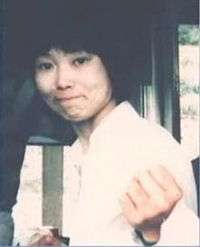Aya Kitō
Aya Kitō (木藤 亜也, Kitō Aya, July 19, 1962 – May 23, 1988) was a Japanese diarist. She wrote about her personal experiences living with spinocerebellar ataxia which was later published in the book 1 Litre no Namida.
Aya Kitō | |
|---|---|
木藤 亜也 | |
 Aya Kitō | |
| Born | July 19, 1962 Toyohashi, Japan |
| Died | May 23, 1988 (aged 25) Tokyo, Japan |
| Cause of death | Spinocerebellar ataxia |
Early life
Aya Kitō was born to Shioka, a nurse, and her husband Mizuno, an office worker. She was the oldest of five siblings, the other four being Ako Kitō, Hiroki Kitō, Kentaro Kitō and Rika Kitō.
Diagnosis with spinocerebellar ataxia
At the age of 15, in 1977, Aya was diagnosed with spinocerebellar ataxia. Her friends helped her with climbing the stairs or walking. But it went harder for them and specially Aya, so she went to a school for disabled people. Until the age of 25, Aya's health continually worsened, and she was eventually unable to complete daily tasks (ADLs). She eventually became confined to her bed, and was unable to walk or speak.
Before being diagnosed with spinocerebellar ataxia, at the age of 14, Aya had started writing a diary. From the age of 15, after her diagnosis, she used it to record her experiences, including her symptoms.
Aya had the incurable disease for 10 years and experienced both emotional and physical pain, which was subsequently stressful to her family as well. Her family, however, continued to support her for the remainder of her life.
Death
Aya Kitō died as a result of her disease on May 23, 1988, only two months before her 26th birthday. She also contracted uremia due to organ failure. Her body was donated for medical research.
Legacy
Her diary, entitled 1 Litre no Namida (1リットルの涙, Ichi Rittoru no Namida, lit. "1 Litre of Tears"), was first published in her native Japan on February 25, 1986, more than two years before her death at the age of 25. Her mother, Shioka Kitō, convinced her to publicize her diary in order to give hope to others since Aya had always wanted to be able to help others.
Her diary was later adapted into a 2004 film, as well as a 2005 television drama series from Fuji TV in which Erika Sawajiri portrayed Kitō.[1]
Shioka also wrote a book after Aya's passing, named Hurdles of Life, to recall Aya's struggles from her own perspective.[2]
References
- "1リットルの涙" (in Japanese). Fuji TV. December 20, 2005. Retrieved August 13, 2018.
- "Kito Shioka". www.goodreads.com. Retrieved 2019-01-04.